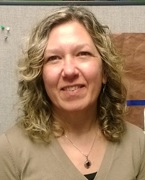Why Invest in QI?
Laura Holmes
- Last Updated on Wednesday, 15 January 2014 20:26
 Known for its frugality, New Hampshire government is certainly lean, but it has recently gone even “Lean-er” in a recent initiative launched by our previous Governor and continued by our current Governor, supporting the use of Lean process improvement tools to ensure that public funds are used as efficiently and effectively as possible, eliminate waste, maintaining fiscal responsibility and protect taxpayer dollars.
Known for its frugality, New Hampshire government is certainly lean, but it has recently gone even “Lean-er” in a recent initiative launched by our previous Governor and continued by our current Governor, supporting the use of Lean process improvement tools to ensure that public funds are used as efficiently and effectively as possible, eliminate waste, maintaining fiscal responsibility and protect taxpayer dollars.
Paula Carden
- Last Updated on Tuesday, 07 May 2013 13:15
 Recently our health department had the opportunity to participate in the QI 101 program offered by the Center for Public Health Quality (CPHQ). As a health director, I was a bit concerned about the cost of investing in this initiative; but, I soon realized that regardless of the cost, I had to take the risk. We were at a point where I knew we would either sink or swim; so, I threw the anchor from the boat in hopes that we could at least stay afloat and not drift too far away.
Recently our health department had the opportunity to participate in the QI 101 program offered by the Center for Public Health Quality (CPHQ). As a health director, I was a bit concerned about the cost of investing in this initiative; but, I soon realized that regardless of the cost, I had to take the risk. We were at a point where I knew we would either sink or swim; so, I threw the anchor from the boat in hopes that we could at least stay afloat and not drift too far away.
Steven Smith
- Last Updated on Tuesday, 05 November 2013 16:28
 In these challenging times for public health, current discussions with a broad range of internal and external stakeholders inevitably focus on recurring themes like accountability, effectiveness, efficiency, customer service, innovation and performance measurement.
In these challenging times for public health, current discussions with a broad range of internal and external stakeholders inevitably focus on recurring themes like accountability, effectiveness, efficiency, customer service, innovation and performance measurement.
Layton Long
- Last Updated on Wednesday, 01 May 2013 20:49
 Investing in Quality Improvement (QI) is like any other investment; you give up something in the present in the hope or promise of seeing that investment pay dividends down the road. QI requires a commitment from management to invest significant staff time and resources on the premise that it will result in organizational improvements and better utilization of existing resources.
Investing in Quality Improvement (QI) is like any other investment; you give up something in the present in the hope or promise of seeing that investment pay dividends down the road. QI requires a commitment from management to invest significant staff time and resources on the premise that it will result in organizational improvements and better utilization of existing resources.
Jim Bruckner
- Last Updated on Thursday, 12 September 2013 14:32
 In recent years, the way we conduct business as local public health (PH) has been directly impacted by the downturn in and slow recovery of the economy, inadequate federal funding, reductions in state resources, losses in state and local PH infrastructure, and increases in the cost of services. Now, local PH is faced with the uncertainty surrounding health reform, fierce competition for market share, continued waning federal and state funding, and a general lack of understanding of local PH services by many elected and appointed officials. So, to say local PH is experiencing some extremely challenging times is an understatement. Local PH now, more than ever, is faced with the imperative to reduce costs and improve efficiency; all while continuing to deliver the high quality services we’ve long been known for.
In recent years, the way we conduct business as local public health (PH) has been directly impacted by the downturn in and slow recovery of the economy, inadequate federal funding, reductions in state resources, losses in state and local PH infrastructure, and increases in the cost of services. Now, local PH is faced with the uncertainty surrounding health reform, fierce competition for market share, continued waning federal and state funding, and a general lack of understanding of local PH services by many elected and appointed officials. So, to say local PH is experiencing some extremely challenging times is an understatement. Local PH now, more than ever, is faced with the imperative to reduce costs and improve efficiency; all while continuing to deliver the high quality services we’ve long been known for.
Ann Absher
- Last Updated on Wednesday, 01 May 2013 20:47
 Fortunately, Wilkes County Health Department was an early adopter of Quality Improvement. My background and previous experience included Quality Improvement in a hospital and home health setting so early in my public health experience I could see benefits from implementing these initiatives. Thanks to the NC Center for Public Health Quality for training and expertise and we have teams that participated in three Lean Kaizen events.
Fortunately, Wilkes County Health Department was an early adopter of Quality Improvement. My background and previous experience included Quality Improvement in a hospital and home health setting so early in my public health experience I could see benefits from implementing these initiatives. Thanks to the NC Center for Public Health Quality for training and expertise and we have teams that participated in three Lean Kaizen events.
Chris Ogden
- Last Updated on Tuesday, 16 July 2013 16:48
Working in any environment is challenging when budget constraints make it increasingly difficult to get things done. State government is no different. In some ways, due to the need for the highest levels of accountability and transparency, it can be even harder for state employees, as many policies and procedures are needed to ensure that these standards are maintained.
I am a Section Operations Manager in NC State Division of Public Health. For me, the word “operations” means “making things work.” There are many other section-wide operations staff that I depend on who are needed to “make things work”. We work with Section Program Management and Division Business Staff to make sure that programmatic budgeting, purchasing, and contracts needs are met.
This operations group has come together in the past few years as a much stronger, unified group. However, despite their experience and confidence, I have not been able to move this group to feel any sense of “empowerment.” When operations staff already feel that getting anything done is extraordinarily difficult, it is hard for me to help them see how they could truly take ownership of anything and have a positive, lasting impact. Even being able to figure out what type of issue to focus on seemed to be insurmountable. That’s where the Center for Public Health Quality (CPHQ) came in!
An opportunity came up for us to apply for a quality improvement project, working with CPHQ staff. We discussed this at our Section Operations Meeting. There was hesitation from some members: some believed that anything “extra” was just another responsibility on their busy plates, while others feared that they would do all this added work only for “things to remain the same” in the end. Due to my personal positive experiences with the CPHQ staff as well as a couple of Operations staff who had participated in previous successful projects in their program, we could discuss these concerns and provide first hand evidence of the value of quality improvement.
Recent issues with purchasing processes on the program side provided a basis for the general focus of the project. The group members that volunteered are all engaged in purchasing activities for their respective programs. I provided sponsorship for them, and obtained support from section and program leadership for these staff to participate in this project. I also discussed this with the Division Purchasing Manager, as we wanted a Division Purchasing representative to work with us on this project, recognizing that if our ideas did not flow into required Division processes, all of our work would be for nothing. This discussion resulted in both the Division Purchasing Manager and her assistant purchasing lead both joining the project. This continues to be a huge benefit as we move towards implementation and completion of our action items.
The project team, or “Buy-It Brigade”, as they call themselves, have worked very hard together to look at the purchasing request process and try to make things more uniform and efficient. The goal was to decrease the time it takes for a purchasing request to be processed through to the Division. They are just now starting to put parts of their plan in place and will hopefully begin to see the results of their efforts. This has not been an easy process by any means. Getting “buy in” from section and division management was only one necessary part of the project; getting buy in from the team members themselves was crucial, followed by that of other purchasing staff who were not on the project team. The team found that the reality of coming up with a plan that everyone agreed on was much more difficult than anticipated, as everyone still had their “best way” of doing things. Formation of a truly cohesive team is a continuous evolution, and the “Buy-It Brigade” continues to do this with every interaction.
In addition to the successful progress made to date on this purchasing project, a major benefit has been in the overall confidence level exhibited by the team members. This could not have been demonstrated more clearly than when they were asked to come to our Section Management Team meeting and present the progress to date of their project. The Section Management Team includes the Section Chief, two Deputies, and every program manager (11). Each project team member presented a portion of the project. The transformation in some of these staff in their speaking ability and confidence level was amazing. What the management team saw was a confident, polished team that conveyed a clear purpose and plan to improve the purchasing request process for our section. I saw this as well; moreover, I also recognized that this group was an “empowered” Operations Team that was “making things work.” I am hoping this spreads to the other section operations staff. I am very proud to be associated with them, and am grateful to the CPHQ staff for their support and assistance in making this happen!
-Chris Ogden, RN, BSN, MSL
Operations Manager, Chronic Disease and Injury Prevention Section
NC Division of Public Health


